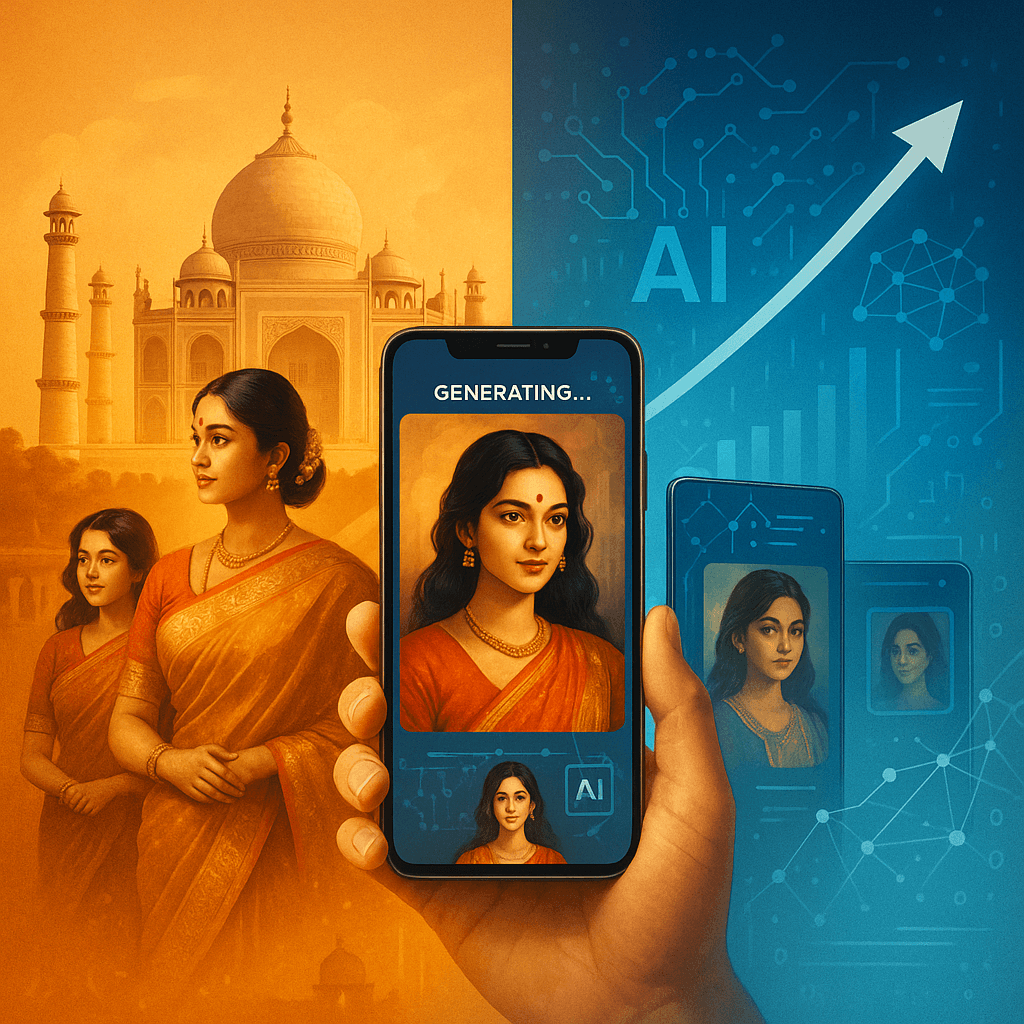Google's Nano Banana image generator just crowned India as its biggest market, with 15.2 million downloads this year driving the Gemini app to #1 globally. Indian users aren't just adopting the AI tool - they're reinventing it with 1990s Bollywood portraits, AI sarees, and viral figurine selfies that are reshaping how the world uses generative AI.
Google's Nano Banana has found its creative heartland in India, where millions of users are turning the AI image generator into something the company never quite expected - a cultural phenomenon that's reshaping global trends. The country now leads worldwide usage of the tool officially known as Gemini 2.5 Flash Image, according to David Sharon, multimodal generation lead for Gemini Apps at Google DeepMind, who shared exclusive insights this week. What started as a simple AI photo editor has become India's latest digital obsession, with users generating everything from 1990s Bollywood throwbacks to miniature figurines of themselves. The creativity explosion has propelled Google's Gemini app straight to the top of both iOS and Android charts globally, making it the most downloaded free app across all categories since September 10. The numbers tell a compelling story. India has racked up 15.2 million Gemini downloads this year through August, crushing the U.S.'s 9.8 million installs, according to exclusive Appfigures data. Daily downloads peaked at 414,000 on September 13 - a staggering 667% jump from the 55,000 installs when Nano Banana first launched on September 1. But it's not just the volume that's catching Google's attention - it's how Indians are using the technology in ways that feel distinctly local yet globally influential. The standout trend? Retro Bollywood portraits where users reimagine themselves in 1990s film star aesthetics, complete with period-accurate fashion, hairstyles, and that unmistakable vintage glamour. 'This trend is local to India,' Sharon told reporters, highlighting how cultural context is driving AI adoption in unexpected directions. A spin-off called the 'AI saree' trend has users generating vintage-style portraits wearing traditional Indian attire, blending cultural heritage with cutting-edge technology. Another uniquely Indian phenomenon involves users placing themselves in front of iconic global landmarks - Big Ben, London's red telephone booths, famous cityscapes - creating a digital tourism effect that lets people virtually visit places they've never been. 'We saw a lot of that in the beginning,' Sharon noted during the media briefing. The creativity doesn't stop there. Indian users are pushing Nano Banana to transform everyday objects, create time-travel effects, and even reimagine themselves as retro postage stamps or in black-and-white portrait styles that echo classical photography. Some are using the tool to visualize meeting their younger selves, creating poignant generational bridges through AI. While not all viral trends originated in India, the country has become a crucial amplifier for global movements. The popular figurine trend - where people generate miniature toy-like versions of themselves positioned in front of computer screens - actually started in Thailand, spread through Indonesia, but only went global after gaining massive traction among Indian users, according to Sharon. This pattern reveals India's emerging role as not just a consumer market but a cultural trendsetter in the AI space. Beyond static images, Indian users are also experimenting with Veo 3 AI video generator, creating short clips that bring old family photos to life, particularly images of grandparents and great-grandparents. It's a deeply personal use case that demonstrates how AI tools are being woven into family storytelling and cultural preservation. The business impact has been immediate and dramatic. Between January and August, the Gemini app averaged 1.9 million monthly downloads in India - 55% higher than in the U.S. - representing 16.6% of global monthly installs. While India leads in downloads, monetization tells a different story. The U.S. still dominates in-app purchases with $2.3 million (35% of the $6.4 million global total), while India contributes just $95,000 (1.5%). However, India's growth trajectory is accelerating faster, with 18% month-over-month spending growth between September 1-16, compared to just 11% globally and under 1% in the U.S. But the viral success comes with growing pains. Privacy advocates are raising concerns about users uploading personal photos for AI transformation, particularly given the intimate nature of many generated images. 'When a user asks us to fulfill their query, we do our best to fulfill that query. We don't try to assume what the user's intent is,' Sharon explained when pressed about data protection measures. has implemented safeguards including visible diamond-shaped watermarks on all Nano Banana-generated images and hidden markers using its to identify AI-created content. The company is also testing a detection platform with researchers and plans to launch a consumer version that would let anyone verify whether an image was AI-generated. But questions remain about how personal data is processed and stored, especially as users upload increasingly intimate family photos and personal images. The Indian market's embrace of Nano Banana reflects broader shifts in how emerging markets are adopting and adapting AI technologies. Rather than simply consuming Western-designed tools, Indian users are actively reshaping them to fit local cultural contexts and creative expressions.












